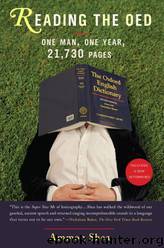Reading the OED: One Man, One Year, 21,730 Pages by Ammon Shea

Author:Ammon Shea
Language: eng
Format: mobi, epub, azw3
ISBN: 9780399535055
Publisher: Perigee Trade
Published: 2009-05-05T00:00:00+00:00
M
AS I READ MY WAY THROUGH THE OED, I try to not allow myself to become distracted. This is a difficult task, for a number of reasons. The essential nature of consulting a dictionary is that it is distracting—it is inevitable that one word will remind me of another word I’ve been wondering about, or will awaken my curiosity as to whether this word and another share an etymological root. And whenever I come across a particularly well-turned phrase in a citation I have to stifle the urge to put the dictionary down and go off to look up whatever book or newspaper it came from so that I might read it in full.
There are other moments in reading the OED that cause distraction; and it is not a distraction that comes from a particularly lovely bit of a sonnet by Shakespeare, or from having my interest piqued by an etymology that seems at once wondrous and improbable. It is when I am distracted simply because the definition provided is so absurd that I have to wonder “What on earth were they thinking?” and I feel compelled to stop reading and investigate.
The first such absurdity I noticed was the entry for cannily. It is defined, in a single entry, as follows:
1. Sagaciously
2. Skilfully
3. Prudently
4. Cautiously
5. Slily
6. Gently
7. Softly
8. Comfortably
For good measure, an etc. is tacked on at the end of the definition. When reading such a well-respected dictionary my first impulse is to assume I must have missed something. But then I think on it for a while and realize that I simply have no idea what they mean. How can cannily mean prudently and comfortably at the same time? If softly and slily are both listed in the same definition of a word, should I then think of them as synonyms? And what purpose does etc. serve in a dictionary—is this James Murray’s way of saying “I’ve supplied you with the first eight meanings of this word; you can make up the rest on your own”?
Later in C I discover that Colubriad is defined simply as “the epic of a snake.” I had no idea that snakes were so advanced that they had gotten around to composing epics, and wonder if they will soon move on to doggerel poetry. Looking further in the entry I can see that this is the title of a work by Cowper in 1782, but no further information is available. I want to put the book down and go look at Cowper, but I feel I don’t have the time.
Several letters pass and I discover what is perhaps my favorite definition of all in the OED: disghibelline (“To distinguish, as a Guelph from a Ghibelline”). When I first read this I was convinced one of the editors had brought his children to work one day, and they amused themselves by creating nonsense definitions for the dictionary, and this one somehow slipped in. This time I could not resist, and went off in search of what Guelphs and Ghibellines are.
Download
Reading the OED: One Man, One Year, 21,730 Pages by Ammon Shea.epub
Reading the OED: One Man, One Year, 21,730 Pages by Ammon Shea.azw3
This site does not store any files on its server. We only index and link to content provided by other sites. Please contact the content providers to delete copyright contents if any and email us, we'll remove relevant links or contents immediately.
A Dictionary of Sociology by Unknown(3071)
The Art of Dramatic Writing: Its Basis in the Creative Interpretation of Human Motives by Egri Lajos(3058)
The Dictionary of Body Language by Joe Navarro(2986)
0041152001443424520 .pdf by Unknown(2843)
How The Mind Works by Steven Pinker(2811)
Day by Elie Wiesel(2779)
Merriam-Webster's Collegiate Thesaurus, Second Edition by Merriam-Webster Inc(2749)
The Meaning of the Library by unknow(2564)
The Official Guide to the TOEFL Test by ETS(2324)
A History of Warfare by John Keegan(2236)
The Emotion Thesaurus: A Writer's Guide to Character Expression by Puglisi Becca & Ackerman Angela(2132)
Emotion Amplifiers by Angela Ackerman & Becca Puglisi(2028)
MASTER LISTS FOR WRITERS: Thesauruses, Plots, Character Traits, Names, and More by Bryn Donovan(1934)
Merriam-Webster's Pocket Dictionary by Merriam-Webster(1929)
The Cambridge Guide to English Usage by PAM PETERS(1907)
Star Wars The Rise of Skywalker The Visual Dictionary by Pablo Hidalgo(1880)
More Than Words (Sweet Lady Kisses) by Helen West(1851)
Lucky Jim by Kingsley Amis(1744)
American Accent Training by Ann Cook(1655)
